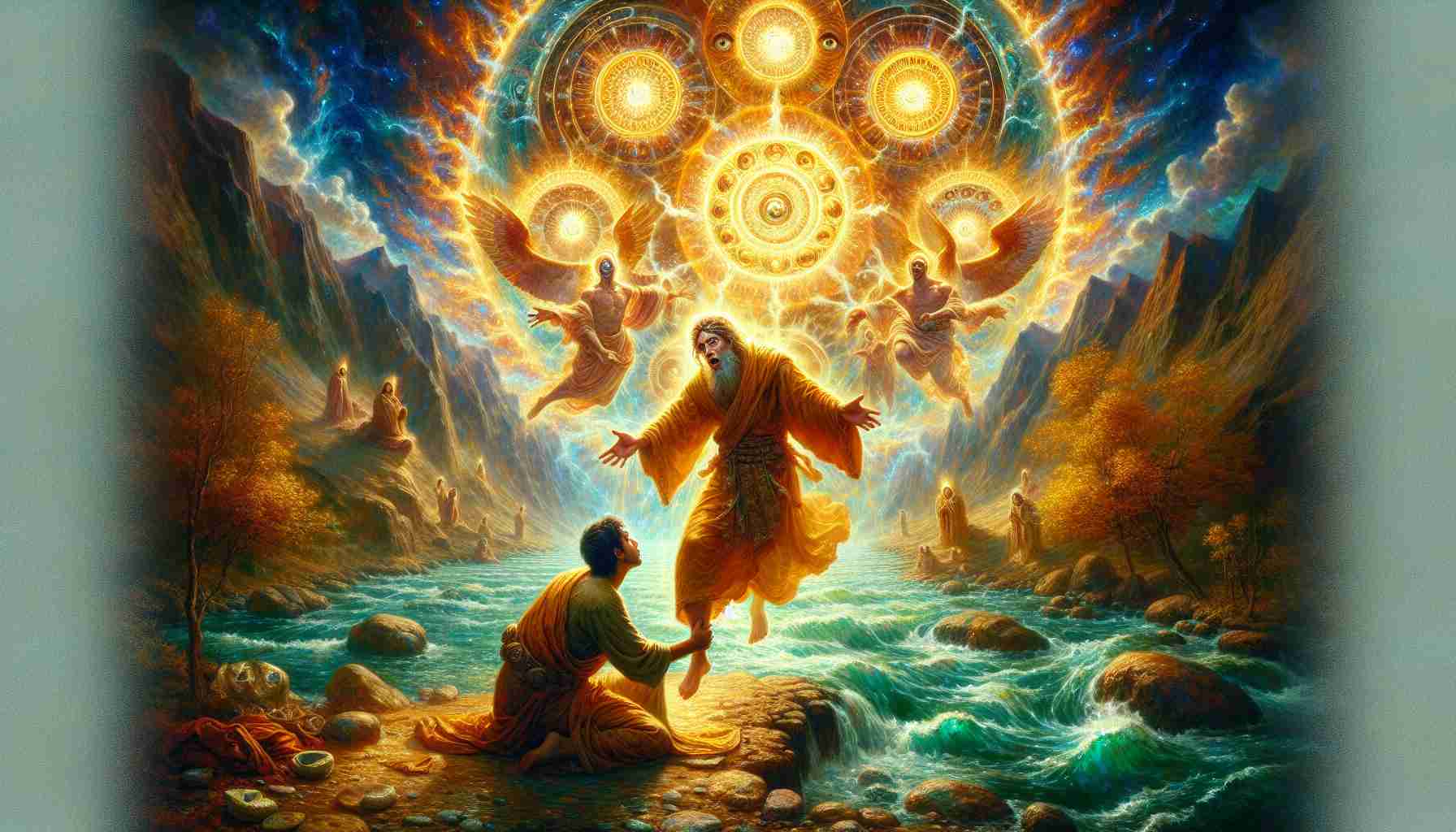

They say the skies opened that day. I believe them. I was standing in the heat of exile, far from home, with no hope left in my chest. My name is Nuri, son of a priest, born in Jerusalem, but raised among the ruins of Babylonian chains.
It had been five years since Nebuchadnezzar—the ruthless king of Babylon—dragged our people from Jerusalem. The Temple, our holiest place, was still standing then, though not for long. We were now prisoners in a foreign land, forced to live beside the Chebar Canal. Every morning I gathered water there, and every morning I wondered if God still saw us.
I was there when it happened. When Ezekiel—he was among the priests, quiet and thoughtful—froze by the water, eyes wide. At first, I thought he saw soldiers coming. But no. What I saw in his eyes wasn’t fear. It was awe. His whole face shifted, like light passing through fire.
“I see the heavens!” he cried.
We gathered around, staring at the empty sky. I didn’t see what he saw, but somehow… I felt it. Like the air itself trembled with something holy. Later, Ezekiel told us of the vision: a stormy wind from the north, a great cloud, flashing fire, and inside it—four living creatures with wings and faces not like ours. He said wheels of fire moved beneath them, full of eyes, and above it all—someone sitting on a throne of sapphire, surrounded by radiance.
Ezekiel fell to the ground, trembling. Some scoffed. Others whispered in wonder. I stood frozen. Somehow, deep in my bones, I knew. God hadn’t abandoned us.
But what struck me more than the vision was what Ezekiel said next.
“God has called me to speak. Even here.”
I didn’t understand. Speak what? To whom? Back in Jerusalem, prophets spoke in the Temple. But here? Among exiles, by a dirty canal, under Babylonian rule?
That night, I sat with him.
“You really believe He still speaks to us?” I asked.
Ezekiel looked at me—stern but kind. “God never left. It is we who stopped listening.”
His words burned hotter than fire. I thought God had turned away after the exile. That He no longer cared. But maybe the fire of the vision wasn’t anger—it was presence. He saw us, even in Babylon.
From that day, everything shifted for me. I rose earlier. I listened when Ezekiel spoke, warnings and comfort alike. I taught my younger brother the Psalms by heart. We prayed while keeping our heads low in a foreign land.
I wasn’t a prophet. I saw no wheels of fire. But I believed.
Years later, when word reached us that the Temple in Jerusalem had fallen, I didn’t fall into despair. I remembered that first fire from Heaven.
Because if Ezekiel could hear God in exile… then maybe all of us could.
They say the skies opened that day. I believe them. I was standing in the heat of exile, far from home, with no hope left in my chest. My name is Nuri, son of a priest, born in Jerusalem, but raised among the ruins of Babylonian chains.
It had been five years since Nebuchadnezzar—the ruthless king of Babylon—dragged our people from Jerusalem. The Temple, our holiest place, was still standing then, though not for long. We were now prisoners in a foreign land, forced to live beside the Chebar Canal. Every morning I gathered water there, and every morning I wondered if God still saw us.
I was there when it happened. When Ezekiel—he was among the priests, quiet and thoughtful—froze by the water, eyes wide. At first, I thought he saw soldiers coming. But no. What I saw in his eyes wasn’t fear. It was awe. His whole face shifted, like light passing through fire.
“I see the heavens!” he cried.
We gathered around, staring at the empty sky. I didn’t see what he saw, but somehow… I felt it. Like the air itself trembled with something holy. Later, Ezekiel told us of the vision: a stormy wind from the north, a great cloud, flashing fire, and inside it—four living creatures with wings and faces not like ours. He said wheels of fire moved beneath them, full of eyes, and above it all—someone sitting on a throne of sapphire, surrounded by radiance.
Ezekiel fell to the ground, trembling. Some scoffed. Others whispered in wonder. I stood frozen. Somehow, deep in my bones, I knew. God hadn’t abandoned us.
But what struck me more than the vision was what Ezekiel said next.
“God has called me to speak. Even here.”
I didn’t understand. Speak what? To whom? Back in Jerusalem, prophets spoke in the Temple. But here? Among exiles, by a dirty canal, under Babylonian rule?
That night, I sat with him.
“You really believe He still speaks to us?” I asked.
Ezekiel looked at me—stern but kind. “God never left. It is we who stopped listening.”
His words burned hotter than fire. I thought God had turned away after the exile. That He no longer cared. But maybe the fire of the vision wasn’t anger—it was presence. He saw us, even in Babylon.
From that day, everything shifted for me. I rose earlier. I listened when Ezekiel spoke, warnings and comfort alike. I taught my younger brother the Psalms by heart. We prayed while keeping our heads low in a foreign land.
I wasn’t a prophet. I saw no wheels of fire. But I believed.
Years later, when word reached us that the Temple in Jerusalem had fallen, I didn’t fall into despair. I remembered that first fire from Heaven.
Because if Ezekiel could hear God in exile… then maybe all of us could.